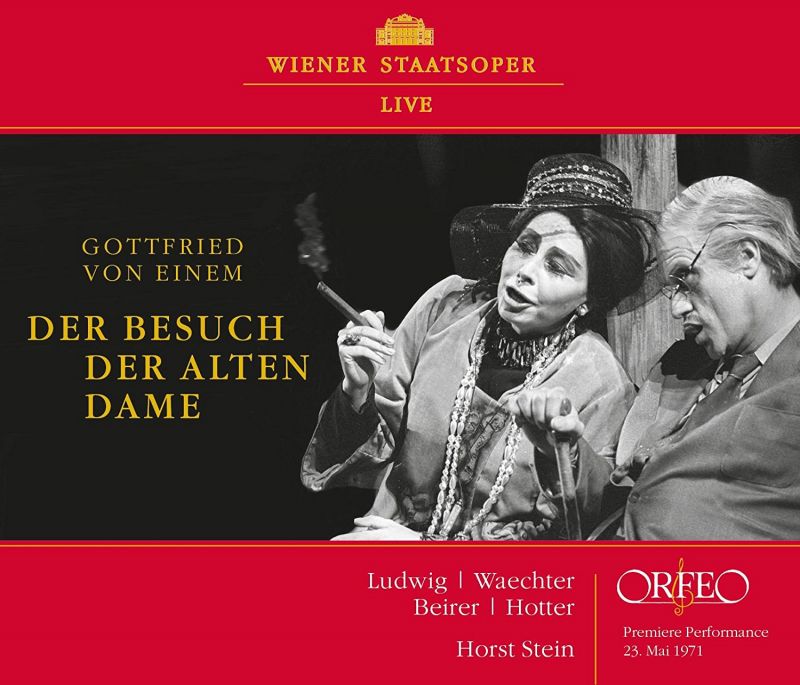EINEM Der Besuch der alten Dame
View record and artist detailsRecord and Artist Details
Composer or Director: Gottfried von Einem
Genre:
Opera
Label: Orfeo
Magazine Review Date: 06/2018
Media Format: CD or Download
Media Runtime: 123
Mastering:
ADD
Catalogue Number: C930 182I

Tracks:
| Composition | Artist Credit |
|---|---|
| Der besuch der alten Dame |
Gottfried von Einem, Composer
Christa Ludwig, Claire Zachanassian, Mezzo soprano Eberhard Waechter, III, Baritone Gottfried von Einem, Composer Hans Beirer, Der Bürgermeister, Tenor Hans Hotter, Teacher, Bass-baritone Heinz Zednik, Butler, Tenor Horst Stein, Conductor Manfred Jungwirth, Der Pfarrer, Bass Vienna State Opera Chorus Vienna State Opera Orchestra |
Author: Mike Ashman
This classic moral dilemma (spoiler alert) has the townfolk yielding to their basest instincts, like German literature’s other satirical targets of the economic ‘miracle’ of the time. The Swiss-born Austrian Gottfried von Einem (whose centenary falls this year) wanted it to put alongside his other classic takeovers of Büchner and Kafka. After some wrangling Dürrenmatt agreed and volunteered a libretto himself, a verbally faithful yet compressed version of his play. At the start of the 1970s the composer’s potential cast list carefully matched, experience- and age-wise, the leading artist roster of the Vienna State Opera. It could provide a star vehicle for Christa Ludwig (touchingly keen to point out in a note of her own here that she was then nowhere near Zachanassian’s age) and parts of substance for Eberhard Waechter as her victim Alfred and Hans Hotter as the Teacher.
There is a drawback, however, just listening. (This recording is of the world premiere broadcast, previously issued on DG LPs and subsequently on Amadeo.) The panoply of scene changes – railway station, town shop, town hall, woodland, farmer’s barn, all of them intentionally parodistic of German Romantic scenery – is not so strongly conveyed to the ear. Von Einem’s music chases Dürrenmatt’s scene-setting most (almost too) faithfully with colourful, often loud tone-painting. The setting of the vocal lines is recitative-dominated and it is hard to get near to a heroine who appears so much in brief laconic conversation. Ludwig’s part does not have the written brio of a woman who is carried around on a chair by two gangsters, accompanied by two blind eunuchs and a panther. Only in the second scene in the Konradsweiler Wood do we get some musical contact with von Einem’s Claire Z. Similarly there is little music – aside from a romantic theme which attaches itself as background to the edgily nostalgic scenes for Claire and Alfred in the wood – which implants a clear aural image of a drama in an audience’s mind. Using an actual spoken play as a supposed guarantee of closer contact with the spectator can reduce – as it did in other operas of the same decade – the composer’s role to that of film-music accompanist.
The performance sounds well-organised (by conductor Stein) and fluent with well-honed contributions from Ludwig (some vertiginous top notes included), Waechter, Hotter and Beirer. The lack of a libretto in Orfeo’s release is a serious error. Dürrenmatt’s Visit has been made also into films and a musical; now we need to see his own opera collaboration on screen at home.
Discover the world's largest classical music catalogue with Presto Music.

Gramophone Digital Club
- Digital Edition
- Digital Archive
- Reviews Database
- Full website access
From £8.75 / month
Subscribe
Gramophone Full Club
- Print Edition
- Digital Edition
- Digital Archive
- Reviews Database
- Full website access
From £11.00 / month
Subscribe
If you are a library, university or other organisation that would be interested in an institutional subscription to Gramophone please click here for further information.




